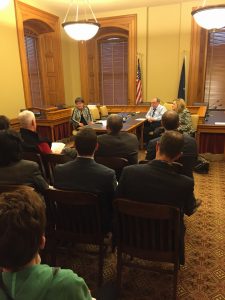The legislature passed major tax legislation on Friday which would essentially end the March to Zero and other tax reforms initiated by Governor Brownback in 2012. On Wednesday, the House took up a package of tax reforms. The House package ends Governor Brownback’s  March to Zero income taxes and, in fact, raises the rates individuals will pay. The lowest rate individuals would pay is set at 2.7%; that’s .1% higher than it was scheduled to be in 2018. For individuals with income between $30,000 and $100,000, the rate would be 5.25%, up from the current 4.6%. A new third bracket is created for those earning over $100,000; their rate would be 5.45%, up from 4.6%. The bill also allows individuals to deduct 100% of medical expenses if they itemize their deductions. The House tax plan also eliminates another signature feature of Governor Brownback’s 2012 tax reforms – the exemption for businesses organized as pass-through entities (LLCs, sub-S corporation, partnerships). All told, the bill is expected to raise roughly $590 million next year and just over $450 million the following year.
March to Zero income taxes and, in fact, raises the rates individuals will pay. The lowest rate individuals would pay is set at 2.7%; that’s .1% higher than it was scheduled to be in 2018. For individuals with income between $30,000 and $100,000, the rate would be 5.25%, up from the current 4.6%. A new third bracket is created for those earning over $100,000; their rate would be 5.45%, up from 4.6%. The bill also allows individuals to deduct 100% of medical expenses if they itemize their deductions. The House tax plan also eliminates another signature feature of Governor Brownback’s 2012 tax reforms – the exemption for businesses organized as pass-through entities (LLCs, sub-S corporation, partnerships). All told, the bill is expected to raise roughly $590 million next year and just over $450 million the following year.
The bill passed the House preliminarily without a single legislator standing to debate its merits. That first vote was 83-39; one vote shy of the 84 votes needed to override a veto. On Thursday, the undebated tax bill came before the House for final action and, although numerous legislators rose this time to explain either their support for the bill or their adamant rejection of it, it passed by a vote of 76-48.
Across the dome, the Senate had taken up and rather ruthlessly dispatched a similar tax plan developed by Senate Democrats. The way was clear for the Senate to receive the House’s plan and take its own vote. Throughout the morning on Friday, Senators stood to deliver impassioned pleas to their colleagues. Some argued the Governor’s so-called experiment had been a failure and that the time was clearly at hand to restore balance to the state’s revenue structure. Others expressed their utter disgust with their own body’s seeming inability or unwillingness to reign in rising expenditures. They claimed a bill to raise taxes is tantamount to telling the world that Kansas is “closed for business.” At end of this very difficult discussion, 22 Senators decided to accept the House package and send it to the Governor. It takes 27 Senators to override a veto.
Now, all eyes are on the Governor. He seems most likely to veto the bill but he might also do nothing and allow it to become law without his signature. Assuming a veto, and assuming neither chamber can marshal the votes to override it, the process to develop another solution for the budget shortfall will commence again in early March after the legislators return from a short break.
Coalition of Local Chambers
 On February 16, the Board of Directors of the Topeka Chamber voted to align itself wholly with the Coalition of Local Chambers, which consists of approximately 20 other local chambers of commerce from across Kansas. The Coalition supports a redesign or repeal of the LLC Exemption; preservation of important economic development programs like HPIP and PEAK; expansion of Medicaid; a fair, adequate and equitable K-12 funding formula; full funding of the T-Works highway program and no further cuts to higher education.
On February 16, the Board of Directors of the Topeka Chamber voted to align itself wholly with the Coalition of Local Chambers, which consists of approximately 20 other local chambers of commerce from across Kansas. The Coalition supports a redesign or repeal of the LLC Exemption; preservation of important economic development programs like HPIP and PEAK; expansion of Medicaid; a fair, adequate and equitable K-12 funding formula; full funding of the T-Works highway program and no further cuts to higher education.
By aligning itself with the Coalition, the Topeka Chamber will be in the best position to participate in the debate about tax reform and advocate for a sensible redesign of the LLC exemption so that it can better achieve its stated purpose of helping small businesses grow and create jobs. Participating in the tax debate should also give the Chamber an improved opportunity to advocate for conservation of funding for various government functions which have an important impact on the community’s ability to attract and retain business and improve Kansans’ quality of life, such as high-quality public education, transportation, economic development incentives and healthcare, while at the same time driving for ever-more cost efficient government at all levels.
Other Bills
The Chamber testified on Monday in favor of a Senate bill which would give cities like Topeka
the ability to designate certain areas where adults could carry alcoholic beverages on the sidewalk. Topeka could tout this sort of socially dynamic environment as a quality of life amenity to attract young professionals. Click here to see the Chamber’s short written testimony.
The bill which addresses blighted housing by giving cities an enhanced ability to reclaim long-abandoned homes and put them into the hands of groups who will restore them has advanced to the floor of the Senate. The Chamber supports this measure as it will give Topeka’s neighborhoods a much better chance of fighting blight and revitalizing themselves.
But Where’s the Pie?
 On Monday afternoon, roughly 20 Chamber members took the opportunity to meet directly with all three of their Shawnee County Senators inside the Kansas Statehouse. Senators Anthony Hensley, Vicki Schmidt, and Laura Kelly joined the group to share their views about the recent tax debate and to field challenging questions about the best way forward. This was the Chamber’s second 2017 installment of its popular Pie and Politics series. As the event was held inside the Statehouse, neither food nor drink was allowed prompting some attendees to ask in feigned dismay, “But how can this be Pie and Politics without the pie?!” Being able to meet face to face with their elected leaders inside the state’s most magnificent building ultimately proved an ample trade-off for a slice of German apple. The final installment of Pie & Politics will be March 6 back at the Chamber Boardroom, where pie is not merely allowed, but will be encouraged. Make plans to attend!
On Monday afternoon, roughly 20 Chamber members took the opportunity to meet directly with all three of their Shawnee County Senators inside the Kansas Statehouse. Senators Anthony Hensley, Vicki Schmidt, and Laura Kelly joined the group to share their views about the recent tax debate and to field challenging questions about the best way forward. This was the Chamber’s second 2017 installment of its popular Pie and Politics series. As the event was held inside the Statehouse, neither food nor drink was allowed prompting some attendees to ask in feigned dismay, “But how can this be Pie and Politics without the pie?!” Being able to meet face to face with their elected leaders inside the state’s most magnificent building ultimately proved an ample trade-off for a slice of German apple. The final installment of Pie & Politics will be March 6 back at the Chamber Boardroom, where pie is not merely allowed, but will be encouraged. Make plans to attend!
To see past legislative updates, click here.
